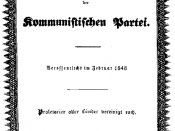Evaluate the usefulness of the theories of class of Marx for an understanding of patterns of inequality in modern industrialised societies.
The cornerstone of Marx's class theory is the premise that "the history of all hitherto existing society is the history of class struggles".
He perceived society as fundamentally divided between classes in pursuit of conflicting class interests. For Marx, class is defined and structured by the relations concerning; work and labour, and ownership or possession of property and the means of production. These economic factors have more influence on social relationships under capitalism than they did in earlier societies. In Marx's theory there are two main classes in capitalism; the bourgeoisie and the proletariat, although other classes such as landlords, petty bourgeoisie, peasants, and lumpenproletariat also exist, Marx does not see these as primary in terms of the dynamics of capitalism.
The bourgeoisie or capitalists are the owners of capital, purchasing labour power and using the surplus value from employment of this labour power to accumulate or expand their capital.
It is the ownership of capital and the ability to exploit labour that is the central point, being wealthy is, in itself, not sufficient to make one a capitalist. What is necessary is the active role of using this wealth to make it self-expansive through employment and exploitation of labour.
The proletariat are owners of labour power (the ability to work), and mere owners of labour power, with no other resources than the ability to work with their hands, bodies, and minds. Since these workers have no property, in order to survive and obtain an income they must find employed work, which for Marx means working for a capitalist-employer in what will inevitably become an exploitative social relationship.
This exploitative work relationship recreates or reproduces itself continually. If the...


